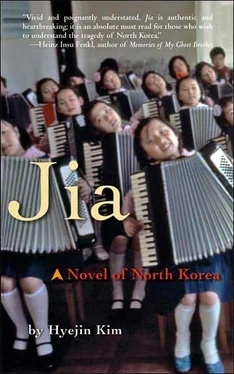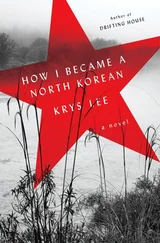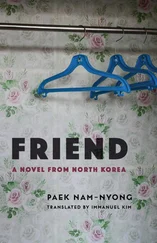Hyejin Kim
JIA
A Novel of North Korea
Almost ten years ago, during a summer spent traveling through England, I met a paunchy middle-aged man on a double-decker bus. When he caught sight of me, bent over from the weight of my backpack, he smiled and asked, “Where are you from?”
“Korea,” I replied, clutching the pole next to the door. The next stop was nine.
“Which Korea?”
I frowned; I didn’t understand what he meant.
“South Korea or North Korea?”
I was completely thrown. I watched his face for another moment. South or North? I wondered.
Showing my bewilderment, I answered, “South” and got off the bus. I stood there for a while, looking back at the bus.
To me, there was just one Korea. My upbringing was strictly anti-North Korea, and discussion of North Korea was shunned. I had never thought of North Korea as a real country and North Koreans as real human beings. In comics and cartoons, North Koreans had red faces or bony features and their leaders were all monsters. Every year, on the anniversary of the beginning of the Korean War, I had to hand in an essay and a painting reviling North Korea. That was the only time I could use my favorite color—red—as much as I wanted.
When I was an infant, my father, a young, passionate history teacher who was curious about other political systems, was convicted of being a North Korean sympathizer. His possession of socialist books was taken as evidence that he worked for the North by the dictators who then ruled South Korea, and his comments to friends and colleagues about problems with the Park Chung Hee administration confirmed to prosecutors that he was a dangerous man. When my father left for prison, my first birthday hadn’t yet passed. Seeing my father five years later, when he was finally released, I cried and shouted at him to get out of my house. I remember his bald head terrifying me.
North Korea and the South Korean dictatorship had created a five-year gap in the relationship between father and daughter; my hostility toward him cost my father many tears.
I came to know my father’s history when I was 14 years old, when my mom told me his story, and since then I have seen North Korea as both a constant threat and a beguiling Pandora’s box, an object of curiosity that we shouldn’t open. Until we can. For me that time came several years ago, when I spent a year living in Shenyang, the hub of northeast China.
On a stifling summer weekend early in my stay, a friend invited me to her grandparents’ house. Far from Shenyang, their town lacked modern facilities and seemed to be inhabited chiefly by the elderly.
My friend’s grandparents are chosur jok, a term that refers to ethnic Koreans who live in China. The province of Liaoning, which borders North Korea, has several chosur jok towns, most of which developed with the migration of Koreans to China earlier in the twentieth century, when Japan made the Korean Peninsula a colony. Living together in northeast China, these Koreans have managed to maintain traditional Korean customs in a foreign land. In the past few years, however, the villages have emptied out, as young people like my friend are lured to the city for work.
In the late afternoon, my visit complete, I headed for the bus station, declining my friend’s offer to see me off. I didn’t want to take a minute of joy away from the wrinkled faces of the two who were hosting their granddaughter. After a twohour wait at a dusty, windy bus stop, I fought my way on board my ride home; competition to survive among 1.3 billion Chinese begins and ends with getting a seat on the bus. I had already learned to give up hope of ever sitting—there was no way to beat the Chinese people. I decided to stand.
“Sit here.” A clear female voice emerged from the surrounding clatter, giving me a small start: someone spoke Korean.
A lovely face smiled, looking up at me. With her hand, she patted a small empty space on her seat. Her strong accent made me think she must be a chosut ok, and she probably thought I was one as well. Her big eyes and small hand were poised for my reply. She tried to make a space for me, and when I tried to refuse, she kept smiling, and said, “Why not? It’s only going to get more crowded.”
That was how I met the woman I have come to call “Jia.” As more and more people scrambled onto the bus, just as she had predicted, we exchanged a few polite questions over the screaming and shoving of our fellow passengers. The commotion in the bus was like a small war.
I asked her if she was born in Liaoning.
She replied lightly, “No, I am North Korean.”
The instant I heard it, I could feel my heart quicken. I am talking to a North Korean right now, I thought; North Korean, not South Korean.
“I came here two years ago,” she continued.
I smiled at her but couldn’t look directly into her eyes. I was afraid somebody had heard what she had said. There might be some North Korean agents among us, who would catch her and take her to the police. My new friend seemed not to care. She asked me where I was heading. We discovered we were both heading to North Station and spent the rest of the ride in silence. Every now and then I stole a glance at her; she had a big bag, but there did not seem to be anything in it.
As the bus began to empty and seats were freed around us, Jia and I stayed put in our shared seat, looking out the window in silence. The tall buildings of downtown Shenyang blocked the strong winds of the outlying area, and the hazy world turned into a clear and colorful one. Eventually we pried ourselves from the seat and stepped off the bus, but our good-bye was not a final one; Jia and I became friends.
What attracted me to her? The purpose of my stay in China was to learn about the Chinese people, not other Koreans—let alone North Koreans. Was I motivated by the curiosity that had been building in me for decades? Soon, I learned about Jia and her compatriots, I entered the world of “other Koreans,” whose lives had previously been closed off to me. I wanted to tell their stories for many reasons, perhaps the most important one being the simplest: because these other Koreans walk the Earth with us.
The characters in this novel, Jia included, are an amalgam of what I saw for myself in China, what I heard from North Korean border crossers and those assisting them, and what I encountered in my research documenting asylum seekers and North Korean society. My original plan to stay in China for two months was stretched to a year, and during that time, I stumbled across a variety of people with links to North Korea: Chinese-born Koreans who had North Korean neighbors, church groups sympathetic to North Koreans, and activists who took risks to help North Korean border crossers. The last group welcomed me, a curious outsider, on their dangerous trips. At first I felt that observing such underground activities was a lucky opportunity, but as time went on I came to feel that it was my destiny, both as a writer and as a Korean.
Over several months in 2001 and 2002, I met with the woman who was the inspiration for Jia. When we first met, she was quiet and shy, but she had the confidence and tranquility of someone who let her life progress with the flow of time. The more time I spent with her, the more that confidence came to the fore, along with her passion and firm hopes for a better life. Her eyes, full of enthusiasm for the future as well as yearning for lost loved ones, continued to stir my mind long after I left China. They led me to put this story to paper.
Читать дальше













